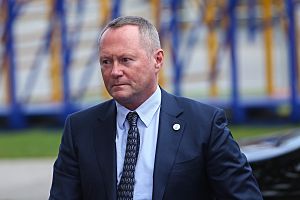Michael O'Flaherty facts for kids
Professor Michael O'Flaherty is a very important person who works to protect human rights. He is currently the Commissioner for Human Rights for the Council of Europe. This means he helps make sure that people's basic rights are respected across many countries in Europe.
Before this, he was the Director of the European Union Fundamental Rights Agency (FRA). He also worked with the United Nations Human Rights Committee (HRC) from 2004 to 2012. In 2011, he became the Chief Commissioner of the Northern Ireland Human Rights Commission (NIHRC), which is a group that protects human rights in Northern Ireland. He left that role in 2013.
Contents
Early Life and Learning
Michael O'Flaherty grew up in Salthill, a town in Galway, Ireland. His father and grandfather were both mayors of Galway. He went to school in Galway and Dublin.
He studied law at University College Dublin. He also studied theology and philosophy in Rome, and international relations in Amsterdam. In the 1980s, he became a priest for the Roman Catholic Church in Galway. However, he stopped working as a priest in 1992.
In 2019, he received a special higher degree in law (LLD) from the National University of Ireland. This was because of all the important work he had published about human rights.
Working for Human Rights
Michael O'Flaherty became a solicitor, which is a type of lawyer, but he chose to work mainly in international human rights.
Teaching About Rights
From 2004 to 2012, he was a professor at the University of Nottingham in England. He taught about human rights and helped lead the Human Rights Law Centre there. In 2012, he became a professor at the National University of Ireland, Galway. He also became the Director of the Irish Centre for Human Rights.
Helping at the United Nations
Michael O'Flaherty worked for the Office of the United Nations High Commissioner for Human Rights (OHCHR). He helped manage programs in Asia and the Pacific. He also led important work in countries like Sierra Leone and Bosnia and Herzegovina. From 2000 to 2002, he was in charge of a UN group that focused on human rights and helping people in need.
He also worked as a secretary for the Committee on the Elimination of Racial Discrimination. He was a senior researcher at the Innocenti Research Centre in Florence, which studies children's rights. He was part of a UN group that looked at how to measure human rights progress. He also advised many groups, including the European Roma Rights Centre.
By 2014, Michael O'Flaherty had written nine books and about 55 articles. All of his writings were about human rights. He helped write an important document called the General Comment on Article 19 of the ICCPR. This document, finished in 2011, explains the international rules for freedom of expression. It talks about how important media freedom is and how human rights apply to new online platforms.
He also helped define and protect the rights of all people, including those with different sexual orientations and gender identities. In 2006, he led the writing of the Yogyakarta Principles. These principles explain how international human rights laws apply to everyone, no matter their sexual orientation or gender identity.
Michael O'Flaherty used to be the chairperson of the Irish Penal Reform Trust. This group works to improve prisons in Ireland. He was also the vice-chair of the Universal Rights Group.
Leading the EU Fundamental Rights Agency
In September 2015, Michael O'Flaherty became the Director of the European Union Fundamental Rights Agency (FRA). The FRA is a special group that provides independent information, analysis, and advice to the European Union. Its job is to help protect the rights of everyone in the EU.
In 2017, he explained that the FRA gathers information and studies human rights challenges. They also give legal advice and help spread a culture of human rights across EU countries.
In a newspaper article from 2015, he shared some of his experiences working in different countries: He wrote about how his job used to be to record human rights problems during wars. He saw many difficult things, but his main goal was to document what was happening. He would then send reports to UN leaders to help them make decisions.
He mentioned that sometimes the work felt hard, but he and his colleagues kept going because of the small successes. They could protect some people just by being there. They also helped improve conditions in places where people were held. They worked to make sure food and aid were given fairly. They also tried to keep the focus on innocent victims of war.
He found it very rewarding years later when his reports and evidence helped bring people to justice for serious crimes.
Becoming the Council of Europe's Human Rights Commissioner
In 2024, Michael O'Flaherty was chosen to be the next Commissioner for Human Rights for the Council of Europe. He was selected after a vote by the Parliamentary Assembly of the Council of Europe. He started this important job on April 1, 2024, taking over from the previous Commissioner, Dunja Mijatović.
 | William M. Jackson |
 | Juan E. Gilbert |
 | Neil deGrasse Tyson |


